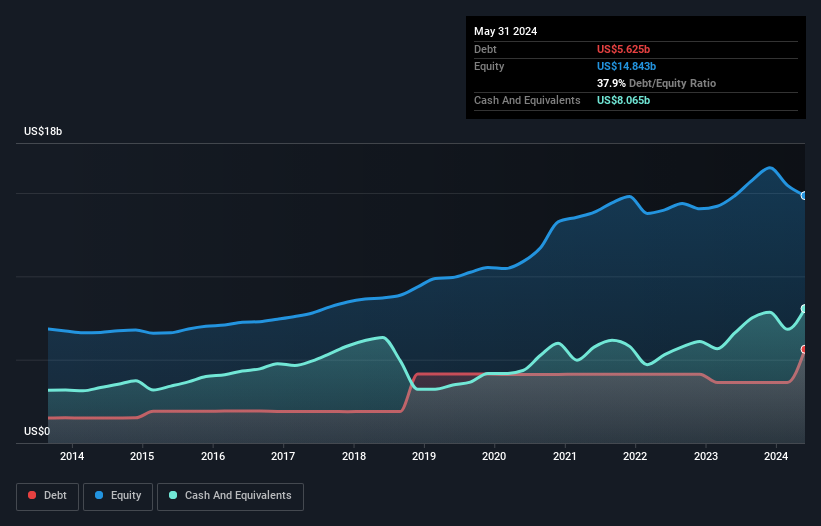- United States
- /
- Software
- /
- NasdaqGS:ADBE
We Think Adobe (NASDAQ:ADBE) Can Manage Its Debt With Ease
Howard Marks put it nicely when he said that, rather than worrying about share price volatility, 'The possibility of permanent loss is the risk I worry about... and every practical investor I know worries about.' So it might be obvious that you need to consider debt, when you think about how risky any given stock is, because too much debt can sink a company. As with many other companies Adobe Inc. (NASDAQ:ADBE) makes use of debt. But is this debt a concern to shareholders?
When Is Debt A Problem?
Debt assists a business until the business has trouble paying it off, either with new capital or with free cash flow. If things get really bad, the lenders can take control of the business. While that is not too common, we often do see indebted companies permanently diluting shareholders because lenders force them to raise capital at a distressed price. Of course, debt can be an important tool in businesses, particularly capital heavy businesses. When we think about a company's use of debt, we first look at cash and debt together.
Check out our latest analysis for Adobe
What Is Adobe's Net Debt?
The image below, which you can click on for greater detail, shows that at May 2024 Adobe had debt of US$5.63b, up from US$3.63b in one year. However, it does have US$8.07b in cash offsetting this, leading to net cash of US$2.44b.

How Healthy Is Adobe's Balance Sheet?
The latest balance sheet data shows that Adobe had liabilities of US$9.47b due within a year, and liabilities of US$5.69b falling due after that. On the other hand, it had cash of US$8.07b and US$1.61b worth of receivables due within a year. So it has liabilities totalling US$5.49b more than its cash and near-term receivables, combined.
Given Adobe has a humongous market capitalization of US$237.8b, it's hard to believe these liabilities pose much threat. But there are sufficient liabilities that we would certainly recommend shareholders continue to monitor the balance sheet, going forward. Despite its noteworthy liabilities, Adobe boasts net cash, so it's fair to say it does not have a heavy debt load!
And we also note warmly that Adobe grew its EBIT by 17% last year, making its debt load easier to handle. When analysing debt levels, the balance sheet is the obvious place to start. But it is future earnings, more than anything, that will determine Adobe's ability to maintain a healthy balance sheet going forward. So if you want to see what the professionals think, you might find this free report on analyst profit forecasts to be interesting.
But our final consideration is also important, because a company cannot pay debt with paper profits; it needs cold hard cash. Adobe may have net cash on the balance sheet, but it is still interesting to look at how well the business converts its earnings before interest and tax (EBIT) to free cash flow, because that will influence both its need for, and its capacity to manage debt. Over the last three years, Adobe actually produced more free cash flow than EBIT. That sort of strong cash generation warms our hearts like a puppy in a bumblebee suit.
Summing Up
We could understand if investors are concerned about Adobe's liabilities, but we can be reassured by the fact it has has net cash of US$2.44b. And it impressed us with free cash flow of US$6.4b, being 106% of its EBIT. So we don't think Adobe's use of debt is risky. The balance sheet is clearly the area to focus on when you are analysing debt. However, not all investment risk resides within the balance sheet - far from it. We've identified 1 warning sign with Adobe , and understanding them should be part of your investment process.
If you're interested in investing in businesses that can grow profits without the burden of debt, then check out this free list of growing businesses that have net cash on the balance sheet.
New: Manage All Your Stock Portfolios in One Place
We've created the ultimate portfolio companion for stock investors, and it's free.
• Connect an unlimited number of Portfolios and see your total in one currency
• Be alerted to new Warning Signs or Risks via email or mobile
• Track the Fair Value of your stocks
Have feedback on this article? Concerned about the content? Get in touch with us directly. Alternatively, email editorial-team (at) simplywallst.com.
This article by Simply Wall St is general in nature. We provide commentary based on historical data and analyst forecasts only using an unbiased methodology and our articles are not intended to be financial advice. It does not constitute a recommendation to buy or sell any stock, and does not take account of your objectives, or your financial situation. We aim to bring you long-term focused analysis driven by fundamental data. Note that our analysis may not factor in the latest price-sensitive company announcements or qualitative material. Simply Wall St has no position in any stocks mentioned.
About NasdaqGS:ADBE
Adobe
Operates as a technology company worldwide.
Outstanding track record and undervalued.
Similar Companies
Market Insights
Weekly Picks


The "Physical AI" Monopoly – A New Industrial Revolution

Czechoslovak Group - is it really so hot?


The Compound Effect: From Acquisition to Integration
Recently Updated Narratives


Inotiv NAMs Test Center

Proximus: The State-Backed Backup Plan with 7% Gross Yield and 15% Currency Upside.


Spotify - A Fundamental and Historical Valuation
Popular Narratives


Is Ubisoft the Market’s Biggest Pricing Error? Why Forensic Value Points to €33 Per Share

Undervalued Key Player in Magnets/Rare Earth


NVDA: Expanding AI Demand Will Drive Major Data Center Investments Through 2026
Trending Discussion

When was the last time that Tesla delivered on its promises? Lets go through the list! The last successful would be the Tesla Model 3 which was 2019 with first deliveries 2017. Roadster not shipped. Tesla Cybertruck global roll out failed. They might have a bunch of prototypes (that are being controlled remotely) And you think they'll be able to ship something as complicated as a robot? It's a pure speculation buy.

This article completely disregards (ignores, forgets) how far China is in this field. If Tesla continues on this path, they will be fighting for their lives trying to sell $40000 dollar robots that can do less than a $10000 dollar one from China will do. Fair value of Tesla? It has always been a hype stock with a valuation completely unbased in reality. Your guess is as good as mine, but especially after the carbon credit scheme got canned, it is downwards of $150.




